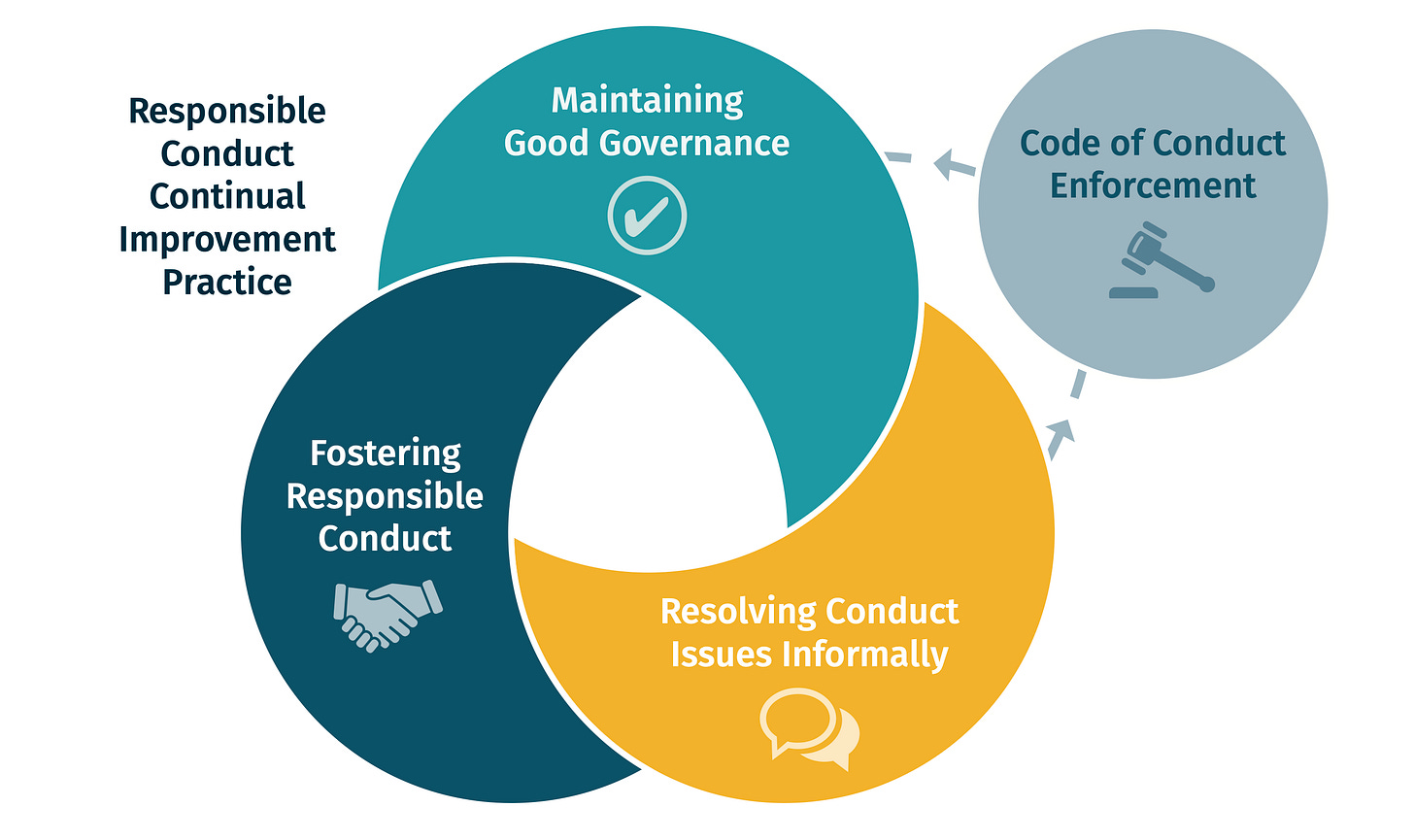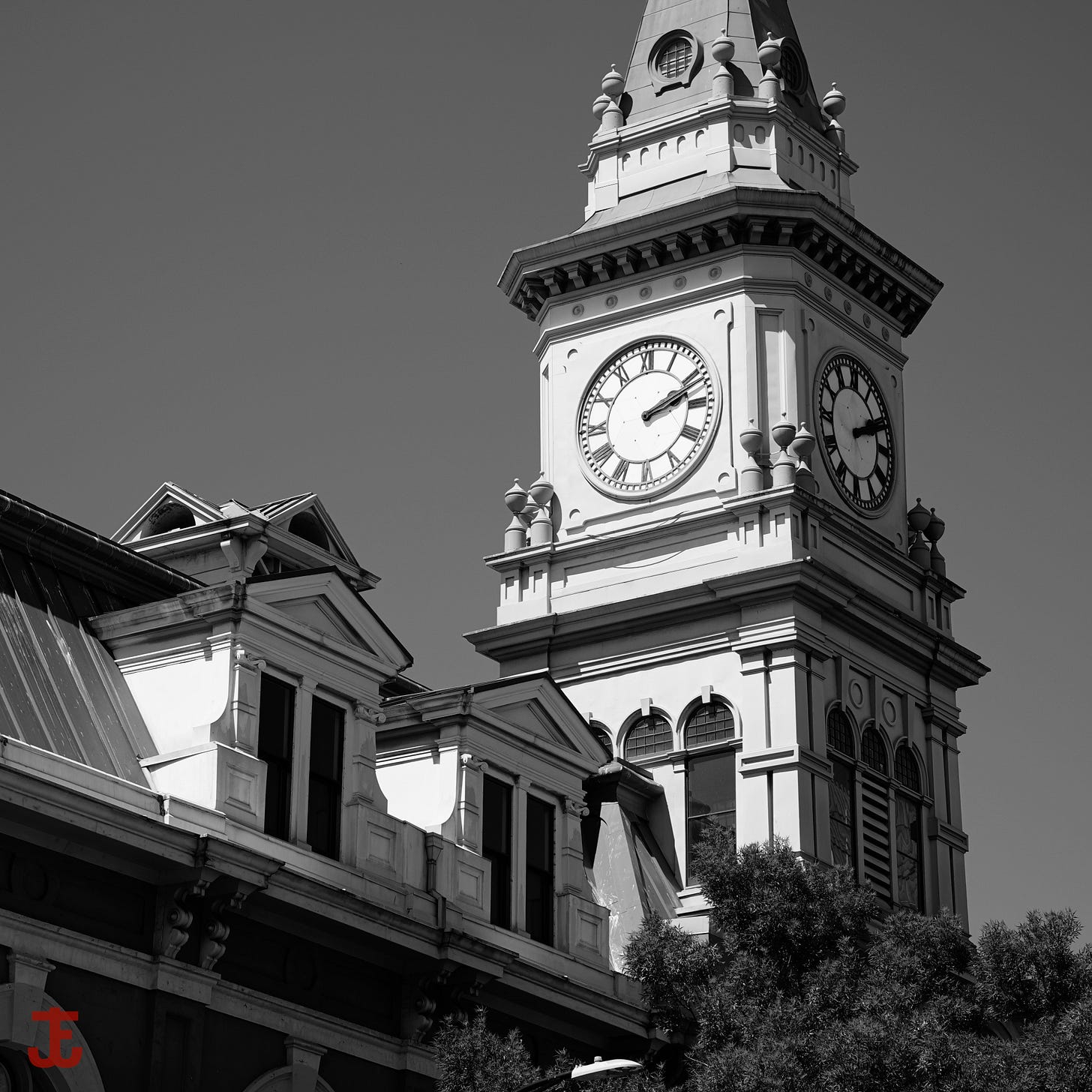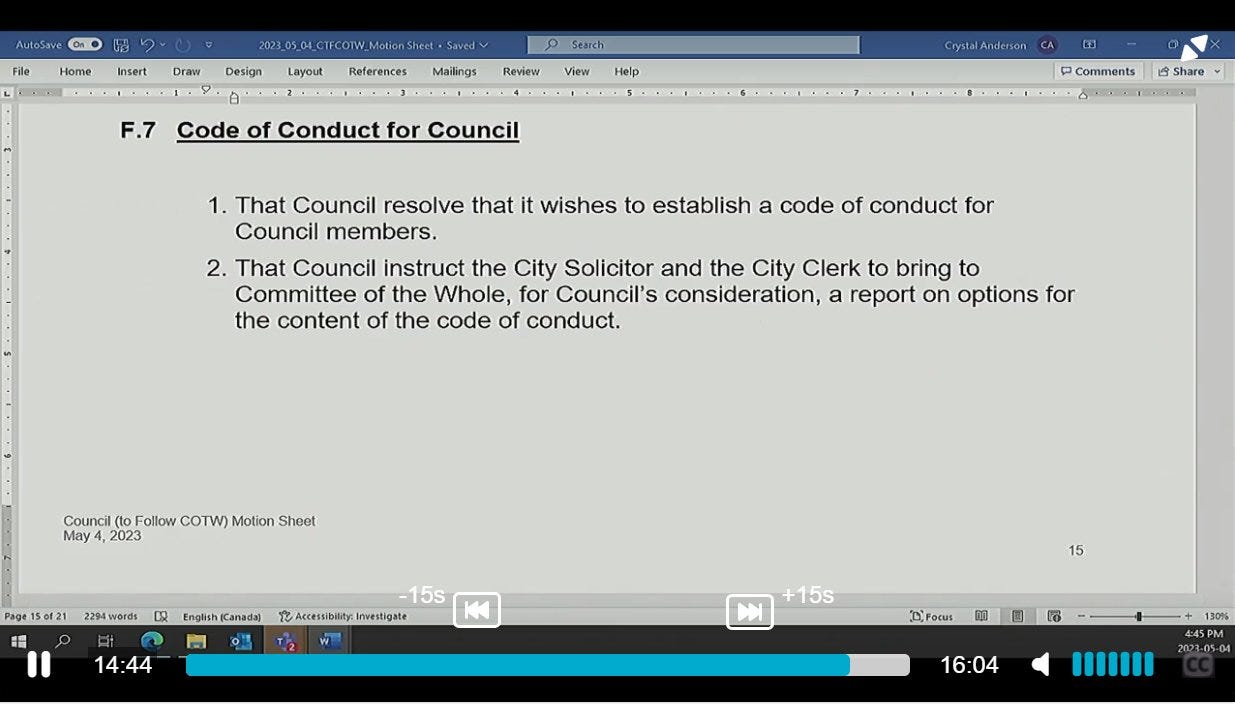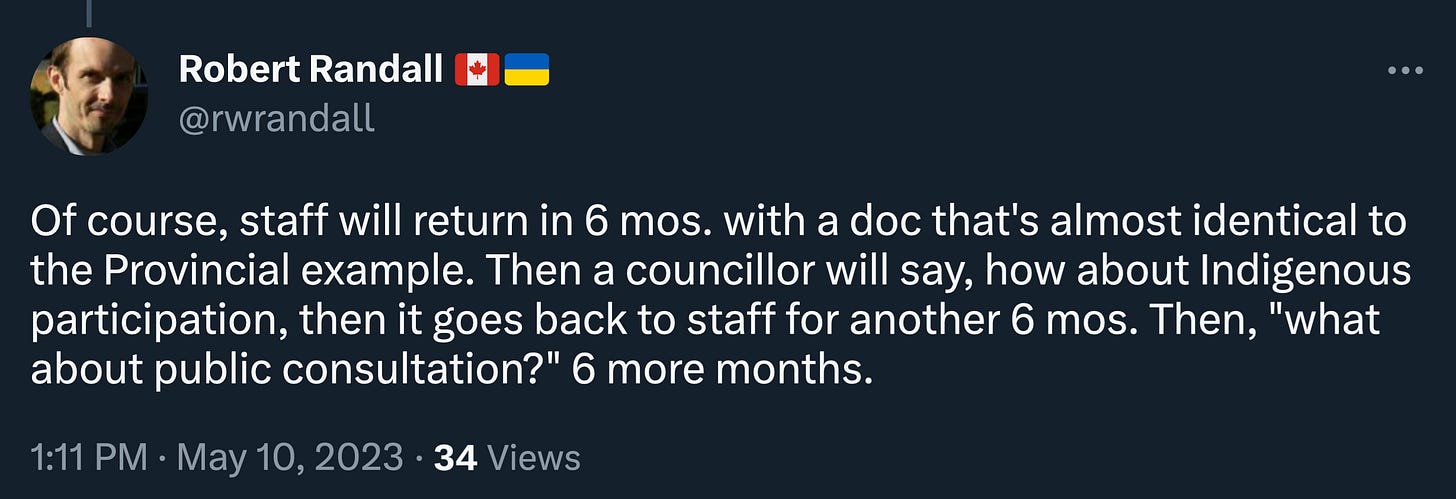Municipal Codes of Conduct Primer
The first instalment of our BC Codes of Conduct series
Editor’s Note: This is the first instalment of a series of newsletters that will be published by The Municipal Fly exploring the topic of municipal Codes of Conduct in British Columbia.
In this newsletter we are going to present a primer on the concept of Codes of Conduct in British Columbia— where they came from, why they exist— and bring readers up to speed on where we are at in the City of Victoria with regard to the creation of a Code of Conduct (spoiler alert: not very far).
In the future we will look at other jurisdictions throughout British Columbia that have or have not adopted Codes of Conduct with the reasoning behind their decision and we will continue to track the development of our own Code of Conduct in Victoria as city councillors and staff work through the process.
Responsible conduct and good governance
The British Columbia Ministry of Municipal Affairs explains that the conduct of elected officials “in their relationships with elected colleagues, staff and the public is directly connected to how a community is governed.” And this makes complete sense because the individuals we elect to govern us go on to represent our community as a whole: our values, our strengths, our weaknesses and what we are willing to tolerate collectively and not.
And so there is a direct link between the conduct of our elected officials and the results we achieve within our community through our local government. This makes the subject of responsible conduct extremely important, demanding clarity of understanding and consequence of action.
The Ministry goes on to explain that the idea of responsible conduct finds a foundation in principles such as “integrity, accountability, respect, and leadership and collaboration.” They clearly articulate the concept of good governance as a local government which is:
Providing for the stewardship of a community’s public assets
Providing services, laws and other matters for community benefit
Acting in a way that is accountable, transparent, ethical, respectful of the rules of law, collaborative, effective and efficient
No doubt, when issues arise around the conduct of locally elected officials it can impact good governance in many negative ways, affecting the quality of service delivery and accountability. Examples of such less-than-responsible conduct from elected officials provided in the document include:
Disputes among elected officials on municipal council and regional district boards
Mistreatment of staff members
Conflict of interest violations
Alleged breaches of procedures or rules during meetings or the duty to respect confidentiality
Marginalization of specific council or board members
Inappropriate use of social media
Ideas such as good governance and good conduct are certainly ambitious but concurrently vague, which require clear definitions and insight into their general understanding and specific application. This is where the Union of British Columbia Municipalities (UBCM) comes into play alongside the provincial government.
The special resolution on responsible conduct
In 2021, the UBCM passed SR3: Strengthening Responsible Conduct (2021) which called on the organization to ask the provincial government to create a “legislative requirement that all local governments in British Columbia must consider the adoption or updating of a Code of Conduct at least once early in each new term of office.”
In addition to this legislative request, the UBCM would ask the provincial government to encourage municipalities to work with the organization to create an educational tool to inform good conduct and update our oaths of office to reflect the expectation of good conduct. These are all good things.
We are just getting this newsletter off of the ground and need as much support as we can get. Please consider subscribing to the newsletter to show your support and get weekly updates sent every Friday morning directly to your email inbox.
If you are already a subscriber, please consider sharing this publication with a relative or friend you think might be interested (and thank you!). Twitter and Facebook are always great venues to share our newsletters and add your own comment and perspective.
The resolution also expands on the definition of good governance, saying that it “requires acting in a way that is accountable, transparent, ethical, respectful of the rules of law, collaborative, effective and efficient.”
This resolution was the culmination of a broad program of research and work done by the Working Group on Responsible Conduct (WGRC) that was struck between the Ministry, the UBCM and the Local Government Management Association (LGMA) in 2016. It was the WGRC that initially recommended the creation and implementation of Codes of Conduct throughout BC municipalities, which at the time did not become law but was encouraged on a voluntary basis by the provincial government and the UBCM.
At no point did the City of Victoria develop or consider the creation of a Code of Conduct formally at that time.
Special Resolution 3 (2021) essentially became the next step in a slow but thoughtful process of building more accountability and transparency around responsible conduct and good governance at the municipal level in British Columbia. With the data from focused research and the development of informed policy tools, the UBCM advanced the program and requested that the hitherto voluntary Codes of Conduct become a part of the laws that govern local government in our province.
In a document entitled Forging the Path to Responsible Conduct In Your Local Government produced by the WGRC in April 2021, the following graphic was provided to help articulate a responsible conduct continual improvement practice that included Code of Conduct enforcement in order to contribute to maintaining good governance:
The Code of Conduct
In addition to training and changes to the oaths of office, the UBCM called on the provincial government to make it law for municipalities to consider the adoption of a Code of Conduct (or review an existing one) within a defined period of time following each local election. It is important to understand what a Code of Conduct is and how it applies to good governance.
Broadly, the Ministry defines the Code of Conduct as “a written document that set shared expectations for conduct or behaviour.” The WGRC, in a document designed to assist elected officials in creating a Code of Conduct, expands on the definition adding it “establish[es] shared expectations for how members should conduct themselves while carrying out their responsibilities and in their work as a collective decision-making body for their community.”
The document produced by the WGRC also includes a worthwhile definition of responsible conduct, saying it “refers to how government elected officials conduct themselves with their elected colleagues, with staff, and with the public. It is grounded in conducting oneself according to principles such as integrity, accountability, respect, and leadership and collaboration.”
In the Model Code of Conduct provided by the WGRC, there are several headings including Introduction, How to interpret the document, and Foundational principals of responsible conduct. The latter heading suggests definitions for each principle related to responsible conduct:
Integrity – means conducting oneself honestly and ethically.
Respect – means valuing the perspectives, wishes, and rights of others.
Accountability – means an obligation and willingness to accept responsibility or to account for one’s actions.
Leadership and Collaboration – means an ability to lead, listen to, and positively influence others; it also means coming together to create or meet a common goal through collective efforts.
Each principle is then expanded on in a series of sections entitled Expected conduct of elected officials and Enforcement mechanisms. And enforcement is terribly important because what’s the point of defining responsible conduct without an agreed upon and open mechanism to enforce the document? Here is what the WGRC has to say about enforcement mechanisms in their model:
A council or board may want to include enforcement mechanisms to support compliance of their code of conduct. These mechanisms may include informal resolution, administratively fair and formal complaint processes, third-party investigators, and sanctions. Local governments are always first encouraged to focus on continuous improvement to foster responsible conduct, maintain good governance, and resolve conduct issues informally.
There is also a part concerning optional sections that specific municipal councils may wish to adopt in their own Codes of Conduct. Among these optional sections are provisions dealing with social media use, policies around social interaction, information handling, gifts, use of public property/resources and provisions for remuneration of elected officials.
A Code of Conduct at its core is a document that defines the principles of responsible conduct without presuming that everyone in the room understands the same definitions of the same principles. The document can be limited or expansive depending on the wishes of the community and council but must include provisions that articulate the expected relationships between elected officials and their colleagues, staff, constituents and general public.
The Council Chamber for many of us is the pinnacle of local governance in our community where important (and sometimes mundane) issues are considered on public record and determined through a transparent and open process.
For another group of people, the Chamber is a place of work where each person is entitled to a harassment-free and fair environment. Sometimes, in the heat and vigour of politics, this can be forgotten and a Code of Conduct articulates expectations to prevent and deal with these sort of breaches (and hopefully the consequences of failing to meet them).
The Chambers being a workplace also applies to the elected officials themselves who are employees of the people of the city and deserve to work in an environment free of the same harassment, bullying and violence that we are all entitled to within our own work spaces. This isn’t limited to when sitting in council business either but when engaging with citizens in the public and through various forms of correspondence including social media.
Furthermore, a Code of Conduct can provide a framework for the broader community to articulate and literally codify our expectations of public officials when engaging with us on an individual and collective basis. Whether this is through personal exchanges, correspondence or engagement through various social media platforms. The document can form a two-way street of transparency, fairness and openness in the interactions and engagements between elected officials and the public-at-large.
And this is this vital in our modern age of politics: to have a living document that defines and codifies these expectations so that responsible conduct is clearly defined and understood and not just so that certain baddies be held account but so everyone can communicate and engage on a level playing field.
A Code of Conduct at its core is a document that defines the principles of responsible conduct without presuming that everyone in the room understands the same definitions of the same principles.
Especially with the recent behaviour of certain elected officials online, Victoria needs an expansive Code of Conduct that includes provisions for conduct on social media and through correspondence with engaged citizens. The MNP report touched on this very issue and we will be exploring those findings with regard to the creation of a Code of Conduct further in this series.
The provincial government’s response
On 13 June 2022, the provincial government passed Order-In-Council 320/2022 which brought into force certain sections of the Municipal Affairs Statues Amendment Act No. 2 (2021). Among those section was the addition of a division within the Community Charter, which include provisions for a Code of Conduct for municipal governments, specifically:
Requirement to consider code of conduct
113.1 (1) Within 6 months after its first regular council meeting following a general local election, a council must decide
(a) whether to establish a code of conduct for council members, or
(b) if a code of conduct for council members has already been established, whether it should be reviewed.
(2) Before making a decision under subsection (1), the council must
(a) consider the prescribed principles for codes of conduct,
(b) consider the other prescribed matters, if any, and
(c) comply with the prescribed requirements, if any, including requirements respecting public notice or consultation.
(3) If the council decides, under subsection (1), not to establish a code of conduct or review an existing code of conduct, it must make available to the public, on request, a statement respecting the reasons for its decision.
Reconsideration of decision respecting code of conduct
113.2 (1) If a council decides, under section 113.1, not to establish a code of conduct or review an existing code of conduct, the council must reconsider that decision before January 1 of the year of the next general local election.
(2) In a reconsideration under subsection (1), the council must
(a) consider the prescribed principles for codes of conduct,
(b) consider the other prescribed matters, if any, and
(c) comply with the prescribed requirements, if any, including requirements respecting public notice or consultation.
(3) If the council confirms the decision that is the subject of the reconsideration, the council must make available to the public, on request, a statement respecting its reasons for confirming the decision.
In a news released issued in October 2021, the provincial government justified the new provisions saying that “local elected officials have a responsibility to act in the best interests of their communities and be accountable to the residents of those communities for their choices.” And went on to explain that the provisions for establishing the requirement for Codes of Conduct were to be considered within a defined timeframe throughout British Columbia.
So the request from the UBMC in 2021 was taken up fully by the provincial government and became law. In addition to the request, the provincial government made it law that if a council decided not to adopt a Code of Conduct that they provide a full explanation that is accessible to members of the community on record.
This enactment in 2021 and coming into force in 2022 was what Councillor Matt Dell referred to when I asked him about the Code of Conduct for Victoria on Twitter near the end of April. Since that time the Victoria City Council has considered the issue of establishing a Code of Conduct.
Victoria’s Code of Conduct
Where does the City of Victoria stand today with regard to a Code of Conduct nearly seven years after the WGRC first recommended a voluntary code and over six months following the previous election in which the new amendments to the Community Charter required consideration for a Code of Conduct? The truth is we are not very far.
A few weeks ago I questioned Matt Dell on Twitter regarding the creation of the Code of Conduct. This was 26 April 2023, which was already just over a week past the 15 April 2023 deadline by law for the consideration in public. This is what Councillor Dell had to say at that time:
Councillors did in fact address the Code of Conduct during a Council to Follow Committee-of-the-Whole meeting on 4 May 2023 (nearly three weeks past deadline) and here is what was presented and unanimously approved by Council during that meeting:
So Victoria Council has resolved to create a Code of Conduct and has instructed staff to provide a report for their consideration, which should contain options for the contents of the Code of Conduct itself.
This is baffling because if you have followed-up on any of the links that I have provided throughout this newsletter from the WGRC, the Ministry or the UBCM, you would see that there are a great many resources already out there for councillors to begin developing the Code of Conduct on their own.
Not only that but all of the stakeholders involve stress the importance of the process of developing the Code of Conduct just as much as having the code itself in place. Don't take my word for it, this is what the WGRC specifically has to say about the process:
How a code of conduct is developed and adopted matters; providing opportunities for council or board members to discuss not just the “what” but also the “why” of a code of conduct will help ensure its effectiveness.
To start with, understanding the context for developing and adopting a code of conduct is important – is the council or board being proactive or have there been particular incidents of concern; does the council or board need to consider its collective “blind spots”, such as identifying and airing subconscious assumptions or systemic barriers? Discussing the language and content of the code of conduct and how it can best be customized to meet the needs of the council or board and individual members is also important. Discussing shared expectations as a part of the orientation process for newly elected officials or including the code of conduct as an outcome of a strategic planning process (with dedicated follow-up opportunities for development) could be good ways of ensuring a code of conduct is adopted in a meaningful way.
Multiple councils since the suggestion was first developed and proposed by the WGRC in 2016 could have begun the process of developing an expansive Code of Conduct for Victoria. And specifically for our previous two councils, it is interesting to note how quickly they were to promote their “first to anything” agenda to fellow British Columbia municipal governments and yet there was never any movement on establishing a Code of Conduct— something which the UBCM has been clear on calling for over many years.
And nearly a month after the legally mandated deadline, our present council has presented the bare bones action on developing a Code of Conduct. They’ve considered the matter and will establish a Code of Conduct but without any timeframe, any framework, any mechanisms or directions for input of any kind save for sending the entire matter to unelected, unaccountable and unreachable staff members to report vaguely on options for the content.
After nearly seven months of this council being struck and nearly a month past the deadline enshrined in provincial law, our local government has opted to toss this matter to staff without any deadlines or clear instructions beyond providing options for the content.
I really can’t say how I feel things are going to go better than former City Council candidate Robert Randall did on Twitter:
And that is the concern. The legislation states that council must only consider whether they want a Code of Conduct and provide a public explanation if they decide not to. If they decide to and then proceed to take forever to implement it while punting it back and forth between staff and various interest groups then there is no provision presently in the law to prevent that from happening. There is actually no legal requirement for a municipality to have a Code of Conduct in place at this time, only to simply consider one within six months of being elected.
Given the fact we never had one in place while it was voluntarily but highly suggested by the UBCM and the WGRC, and that we were late considering it once it was enshrined in law, can we really trust our council to collectively take this issue seriously? Only time will tell but we will be here to follow the issue and cover it in-depth along the way. Stay tuned…










